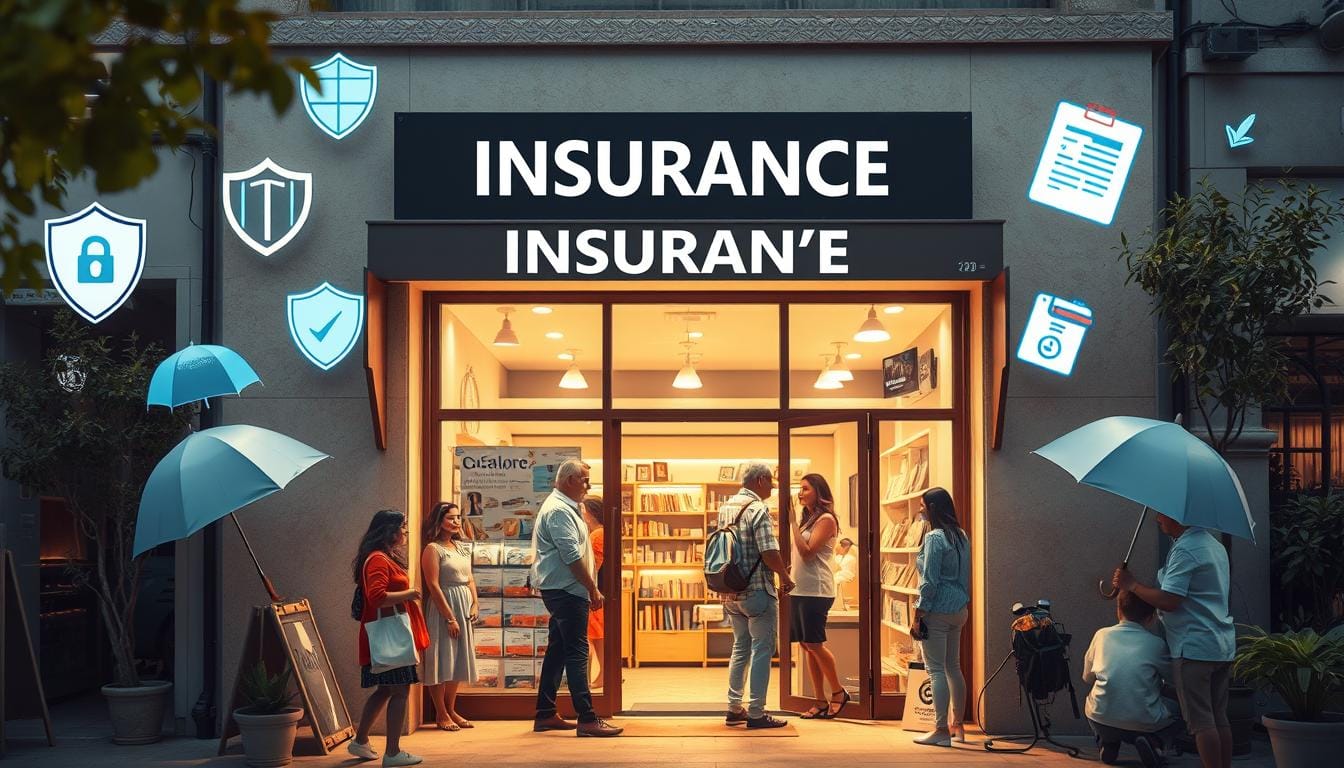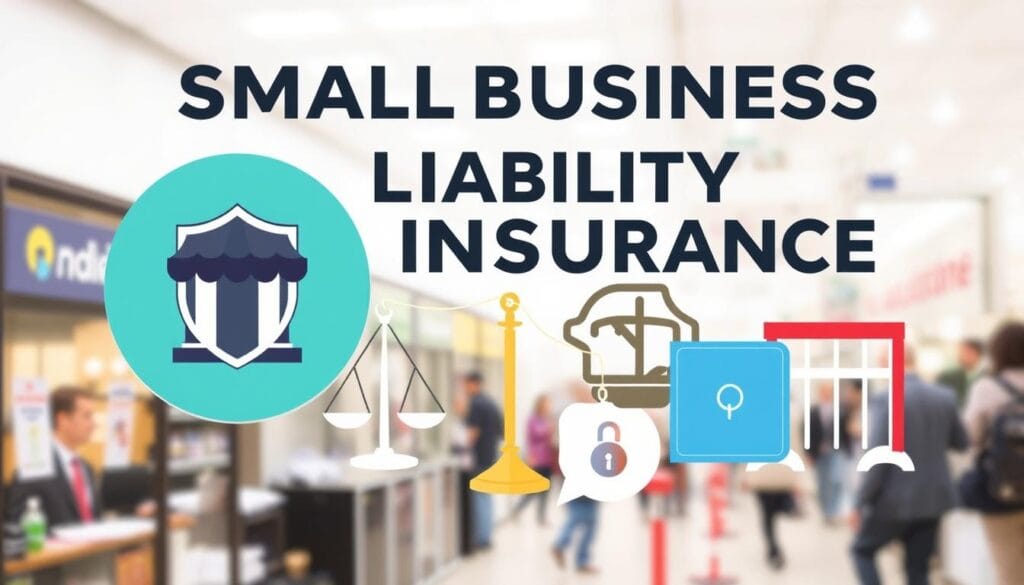Essential Guide to Small Business Insurance: Protect Your Business Today

Did you know that small business insurance protects against many risks? These risks could lead to financial loss. The right insurance can help your business stay afloat, even in tough times. With over 200 years of experience, insurance is a must for small businesses.
As a small business owner, you face many challenges. These include property damage and liability claims. Small business insurance acts as a safety net, ensuring your business can keep going.
In this guide, we’ll look at different types of small business insurance. This includes General Liability Insurance and Property Insurance. We’ll also talk about the importance of understanding policy details and comparing quotes.
By the end of this guide, you’ll know how to protect your business. You’ll see why insurance is key for credibility, meeting contracts, and attracting employees.
Table of Contents
Understanding Small Business Insurance Basics
Getting the right business insurance for small business is key to protect your business from unexpected problems. Every small business faces different risks based on its type and how it operates.

What Small Business Insurance Covers
Small business insurance protects against many types of losses. It keeps your physical and intangible assets safe. Key areas include:
- Property Insurance: Keeps your business assets safe from damage or loss due to fires, theft, and natural disasters.
- Liability Insurance: Protects your business from legal claims due to accidents, injuries, or negligence.
- Workers’ Compensation: Helps employees who get hurt on the job by covering medical costs and disability.
- Cyber Liability Insurance: Safeguards against electronic threats like data breaches and ransomware attacks.
Why Insurance Protection Is Essential
Without enough insurance, your business is at risk of big financial and legal problems. Unexpected events can lead to huge costs and even shut down your business. Insurance helps you bounce back and keep running during tough times.
Key Terms You Need to Know
Knowing insurance terms is important for making smart choices. Here are some key ones:
- Premium: The cost of your insurance policy, paid monthly or yearly.
- Deductible: The amount you pay first before your insurance starts covering.
- Coverage Limit: The most your insurance will pay for a covered loss.
- Exclusions: Certain situations or conditions not covered by your policy.
| Insurance Type | Coverage | Key Benefits |
|---|---|---|
| Property Insurance | Buildings, equipment, inventory | Protection against physical damage or loss |
| Liability Insurance | Legal claims, accidents, injuries | Covers legal fees and settlements |
| Workers’ Compensation | Employee medical expenses, disability | Ensures employee welfare and legal compliance |
| Cyber Liability Insurance | Data breaches, ransomware, hacking | Protects against electronic threats and data loss |
Types of Small Business Insurance You Need to Consider
Understanding the different types of insurance is key to protecting your business. Small business liability insurance is a must. It covers claims for bodily injury or property damage. This insurance shields your assets from unexpected lawsuits.
General liability insurance for small business is another essential. It acts as your first defense against common risks. It covers injuries to customers or accidents on your premises. Property insurance also protects your business assets, like buildings and equipment, from damage or loss.
Workers’ compensation insurance is vital for your employees. It provides benefits if they get hurt on the job. For businesses handling sensitive info, data breach insurance is a must. It guards against cyber threats and helps manage data leaks.
Here’s a table showing the main insurance types and their average monthly costs:
| Insurance Type | Average Monthly Cost |
|---|---|
| General Liability Insurance | $42 |
| Professional Liability Insurance | $61 |
| Workers’ Compensation Insurance | $45 |
| Commercial Auto Insurance | $147 |
| Cyber Insurance | $145 |
| Commercial Property Insurance | $67 |
Choosing the right mix of these insurances gives you full protection. It’s tailored to your business’s specific needs.

General Liability Insurance: Your First Line of Defense
Getting general liability insurance for small business is key to protecting your business. It keeps you safe from lawsuits over property damage, injuries, or mistakes in ads.
Coverage Details and Limits
Small business insurance usually covers up to $1 million per claim and $2 million total. You can get it for about $42 a month from places like Insureon. It pays for legal fees and settlements, keeping your money safe during lawsuits.
Common Claims Scenarios
Businesses often deal with claims like:
- Slip and fall accidents on your premises.
- Damage caused by your products or services.
- Defamation or advertising inaccuracies.
Industry-Specific Considerations
Your insurance needs can change based on your industry. For example, construction needs more coverage because of the risks. Tech startups might focus on advertising and product liability. Customizing your small business insurance plans helps protect your business well.
Professional Liability and Errors & Omissions Coverage
As a small business owner, protecting your services is key. Professional liability insurance, also known as Errors & Omissions (E&O) insurance, shields you from financial losses. It covers lawsuits and claims from clients.
It’s different from general liability insurance. General liability covers accidents and injuries. But professional liability insurance is for mistakes, negligence, and errors in your services. This is important for businesses like IT consultants, real estate agents, and tax preparers.
- Coverage Includes:
- Legal defense costs
- Court costs
- Settlements and judgments
- Common Claims:
- Negligence
- Misrepresentation
- Breach of duty
The average cost for insurance for small businesses is about $61 per month. Many pay less than $50. It’s important to choose the right coverage limits, usually $1 million per occurrence and aggregate. This ensures you’re well-protected.
Top carriers like Hiscox, Travelers, and The Hartford offer E&O insurance for different industries. They help you find the best coverage for your business.
Property Insurance for Your Business Assets
Protecting your business assets is key. Property insurance is vital for safeguarding what you own. Knowing your options helps you pick the right small business insurance.
Building Coverage Options
If you own or lease your business space, property insurance covers it. Replacement cost coverage rebuilds or replaces damaged property. On the other hand, actual cash value considers depreciation, which affects your insurance cost.
Equipment and Inventory Protection
Your equipment and inventory are essential for your business. Insuring them protects against theft or damage. Different equipment may need special coverage for full protection.
Business Interruption Insurance
Unexpected closures can hurt your income. Business interruption insurance helps replace lost revenue. It’s key for keeping your business stable financially.
| Insurance Type | Average Monthly Cost | Annual Cost |
|---|---|---|
| Commercial Property Insurance | $67 | $800 |
| Business Owner’s Policy (BOP) | $57 | $684 |
| Commercial Auto Insurance | $147 | $1,762 |
| Cyber Insurance | $145 | $1,740 |
| Professional Liability Insurance | $61 | $735 |
How Much Does Small Business Insurance Cost?
The cost of small business insurance changes a lot. It depends on many things. Knowing these can help you figure out how much is small business insurance and keep your small business insurance cost down.
Factors Affecting Premium Rates
- Business size and number of employees
- Industry type and associated risks
- Location and state-specific regulations
- Claims history and business experience
- Coverage limits and deductibles chosen
Ways to Reduce Insurance Costs
- Bundle multiple insurance policies
- Implement safety and risk management measures
- Increase your deductible
- Regularly review and update your coverage needs
- Choose a reputable insurance provider with competitive rates
| Insurance Type | Average Monthly Cost |
|---|---|
| General Liability | $42 |
| Workers’ Compensation | $45 |
| Professional Liability (E&O) | $61 |
| Cyber Insurance | $145 |
| Commercial Property | $67 |
| Business Owner’s Policy (BOP) | $57 |
| Commercial Auto | $147 |
| Commercial Umbrella | $75 |
Choosing the Best Small Business Insurance Provider
Finding the right insurance for your business is key. With many small business insurance plans out there, picking the best one can be tough.
Look at a provider’s financial health and customer service. Chubb, Next Insurance, and The Hartford are top choices. They are known for being reliable and having wide coverage options.
- Chubb: Rated 5.0 for extensive coverage and exceptional support.
- Next Insurance: Also rated 5.0, known for tailored plans for various industries.
- Progressive: Rated 4.5, offers a broad network of repair shops and 24/7 service.
- Thimble: Rated 4.0, ideal for short-term and event-specific insurance needs.
- The Hartford: Rated 5.0, provides customizable options like cyber insurance and business income coverage.
Getting quotes from over 30 major insurers can save you about 30% on premiums. The cheapest option isn’t always the best. Look for plans that meet your needs without sacrificing quality.
Choose whether to work with an insurance broker or go directly to companies. Brokers can give you personalized advice and access to many providers. On the other hand, dealing directly might be easier for some businesses.
By carefully looking at your business needs and comparing providers, you can find a policy that protects and values your business.
Creating Your Customized Insurance Package
Creating small business insurance plans that fit your needs is key. Start by looking at the risks your business faces.
Assessment of Your Business Needs
Think about your industry, business size, and where you’re located. For example, a retail store might need general liability insurance. This can cover claims like a customer injury, which can cost around $30,000. Knowing these details helps pick the right insurance for your business.
Coverage Combinations and Options
Putting together different policies can give you more protection. A Business Owner’s Policy (BOP) includes general liability, commercial property, and business income insurance. This gives you a solid coverage package. Plus, combining insurance plans can save you up to 10% on premiums.
It’s important to check your insurance package often. This makes sure it keeps up with your business’s growth and changing needs. By tailoring your business insurance, you protect your assets and help your business thrive in the long run.
Common Insurance Mistakes to Avoid
Getting the right insurance for your business is key. Steer clear of common errors to avoid big financial hits.
Underinsuring Your Business
Not having enough small business liability insurance puts you at risk. A big claim could lead to fines or legal trouble. For instance, not having employer liability cover can cost £2,500 a day.
Overlooking Critical Coverage Types
Some small business owners miss out on important insurance types. Cyber liability and employment practices liability insurance are vital. Without them, you could face huge legal bills and compensation costs, possibly in the hundreds of thousands.
| Mistake | Potential Impact |
|---|---|
| Underinsuring Your Business | Heavy fines, legal actions, financial loss |
| Overlooking Critical Coverage Types | High legal and compensation costs |
| Assuming Personal Insurance Suffices | Inadequate protection for business activities |
Steps to Purchase Small Business Insurance
Buying small business insurance is key to protecting your business. Here’s how to do it right:
- Assess Your Business Needs: Find out what insurance laws require and what’s good for your business.
- Research Providers: Look at different insurance companies to find the best fit for your needs.
- Understand Insurance Quotes: Figure out how much insurance costs by comparing quotes and what they include.
- Ensure Full Disclosure: Give accurate info when applying to avoid problems later.
- Consider Agents or Brokers: Think about getting help from pros to understand complex insurance options.
- Review Policy Documents: Read and understand policy terms before you buy.
Getting the right insurance protects your assets and can prevent big financial losses.
| Step | Action | Outcome |
|---|---|---|
| 1 | Assess Your Business Needs | Identify required and beneficial insurance types |
| 2 | Research Providers | Find providers with the best coverage |
| 3 | Understand Insurance Quotes | Figure out insurance costs |
| 4 | Ensure Full Disclosure | Avoid coverage problems |
| 5 | Consider Agents or Brokers | Get help with complex options |
| 6 | Review Policy Documents | Make sure you understand before buying |
Managing and Updating Your Insurance Policies
Keeping your small business insurance plans up to date is key to ongoing protection. Regular updates ensure your insurance stays in sync with your business’s changing needs.
Annual Review Process
Reviewing your business insurance annually is a must. It helps spot any gaps or changes needed. Think about these points during your review:
- Changes in the number of employees
- Introduction of new products or services
- Acquisition of new equipment
- Expansion to new locations
When to Modify Coverage
There are times when you need to tweak your small business insurance plans:
- Your business grows a lot.
- You start new product lines or services.
- You buy more business assets.
- You change how your business operates or is structured.
Updating your policies is vital for the right protection. It can also impact your insurance costs.
| Scenario | Action Required |
|---|---|
| Hiring new employees | Update workers’ compensation and liability coverage |
| Launching a new product line | Adjust professional liability and product liability insurance |
| Purchasing new equipment | Increase commercial property insurance coverage |
| Expanding to new locations | Extend commercial property and general liability insurance |
Conclusion: Securing Your Business Future Through Proper Insurance
Getting small business insurance is key to protecting your business from surprises. It keeps your assets safe and lets your business handle unexpected events.
We’ve looked at important types of insurance, like general liability, property insurance, and workers’ compensation. Each type protects different parts of your business, like your stuff and your employees.
Having good insurance coverage gives you peace of mind. It lets you grow and innovate your business without worrying about risks. It’s a smart move for long-term success.
It’s important to check your insurance or get new coverage to make your business strong. Start taking steps today to protect your business from future surprises.






